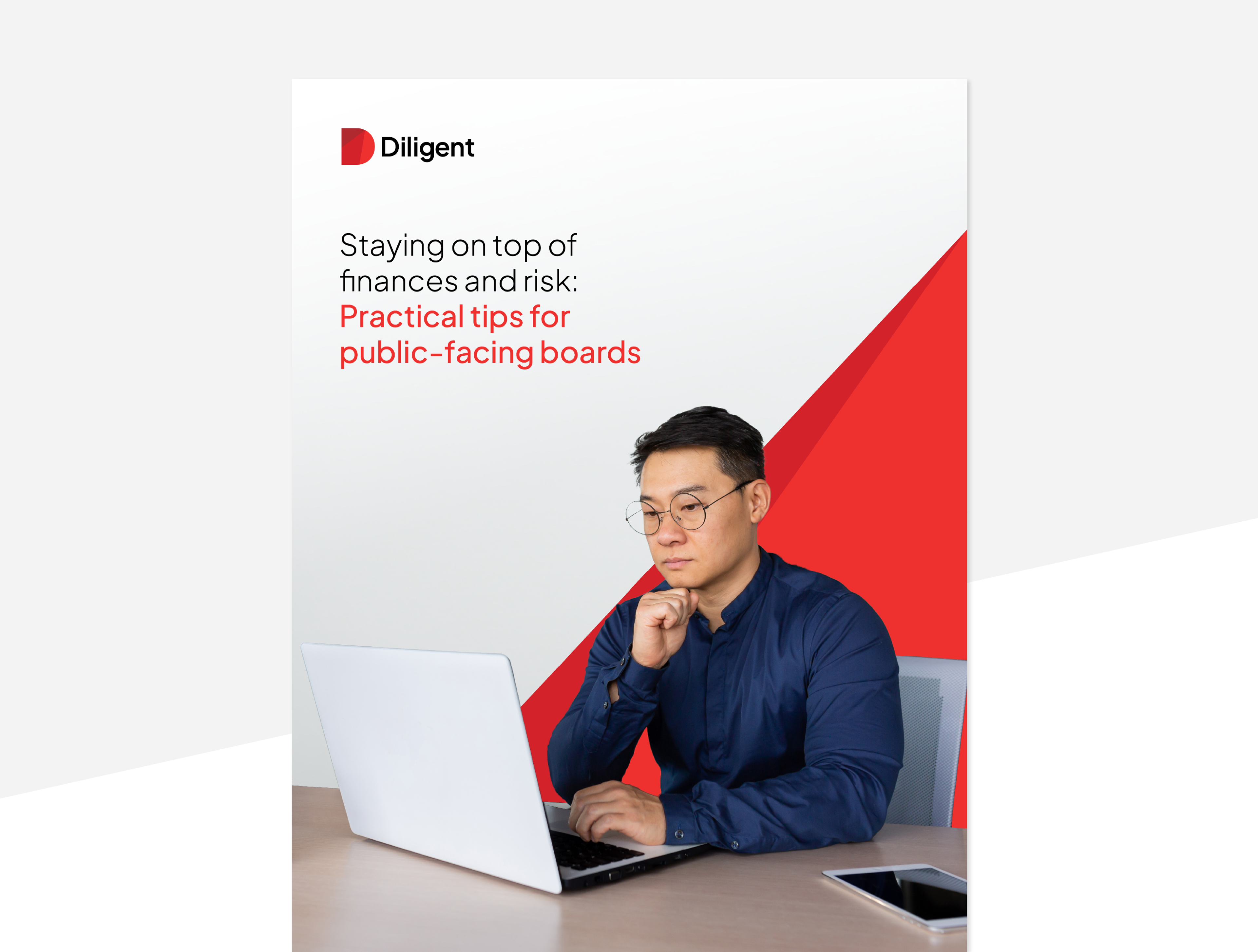What public boards need to know about financial oversight and risk

Budget oversight for public boards is never just about dollars and cents. For school board and local government leaders, every decision has a ripple effect on classrooms, neighborhoods and public services. At the same time, leaders are balancing tight budgets, shifting priorities and the need to demonstrate transparency to their constituents.
Strong financial and risk oversight isn’t only about stability; it’s about earning and keeping the public’s trust.
That’s the focus of Smart oversight: Proactive budget risk defense for school districts & local government, a recent Diligent webinar. The session was moderated by Kristin Karel, director of sales for the public sector at Diligent, who partners closely with elected boards and understands the challenges they face on the ground. The conversation considered how proactive oversight can help public leaders not only manage risk but also build confidence with their communities and keep essential services moving forward, even when circumstances change quickly.
Watch the full 45-minute discussion here, and read on for some of the highlights.
Mitigating risk requires vigilance
Boards and councils must have a constant view of risks that lay ahead, which means building risk assessment and planning into the entity’s ongoing work. Risks can range from natural disasters to changing regulations, but they all require a nimble response.
Terry Spradlin, executive director of the Indiana School Boards Association, noted several types of risks local school boards face. “In Indiana, we're prone to tornadoes and floods, so there's that element of risk to facilities,” he said. “We have cybersecurity risk and have to protect the business operations of our school districts. Then there's the unfortunate circumstance of fraud or mismanagement. If the board's doing its work and providing financial oversight, we can be proactive and prevent fiscal mismanagement or fraud because we're being diligent about doing the work and providing appropriate financial oversight.”
Stephen Powell, assistant city administrator for the City of Leawood, Kansas, addressed different concerns: “If we can't make our bond payments, that's huge. So we’re looking at some of those funds that we use that are not our general fund, making sure our funds are healthy and that if something happens, whether it be through the state legislature changing a law or a downturn in the economy, we have a game plan to fill in the hole it might create in our budget so that our financial risks can be mitigated as much as possible.”
Integrate transparency in all your work
A policy of transparency continues to reap rewards for schools and municipalities that want to build trust and diminish risk in their communities. After all, stakeholder transparency is one of the five essentials of financial oversight.
As Spradlin notes, transparency exists from the top down, and many key contributors have a role to play: “The administration will be having conversations with personnel, including the teachers’ union about salary benefits and the collective bargaining process. The CFO will be advising the superintendent and the board on financial conditions. The transportation director will be informing the board and the administration about transportation costs. The administrative team working well together to provide the right information to the school board is such a critical part of transparency and accountability.”
The right tools also matter. Powell describes how a new solution helped with budget transparency: “In the last year or two, we've made some pretty significant investments in new budgeting and finance software, and that has allowed us to not only access our data more seamlessly than we were able to before, but it is also going to allow us to put our checkbook online so that anybody can see where the money's going. Putting more of our information online in a format that allows residents to drill down is a lot more transparent than just putting a 600-page PDF of the budget document.”
Make sure your team is prepared to pivot
Having an eye on the horizon for changes, whether big or small, keeps your team ready to adjust. Powell shares a couple of different ways his municipal team watches for change: “We look for sales tax collection trends as we go through the year and use that data to adjust our projections, either up or down. For instance, right now we're looking like we're about a half-percent lower than what we projected, so we're starting to adjust those projections down a little bit to make sure that we can live within a realistic budget assumption.”
He adds, “There are more risks that we're looking into, particularly with the possibility that the state may limit our property tax collections. We're really trying to educate the governing body. ‘If this were to happen, here's what to expect.’ And a lot of those expectations, they may not have ever had to deal with before in the budget process. It’s taking this time to educate our council on things getting ready to change for us as they're going to change for probably everybody in Kansas.”
Ask questions when looking at data
Every board or council should be an active assessor of the information they review for meetings and beyond and know the right questions to ask. This can require coaching, as Spradlin explains.
“Before the meeting, they should be receiving a board packet, maybe that's online through a paperless management system like Diligent Community,” he says. “They need to review the materials and then ask themselves, ‘What information don't we have that we need?’ We guide them on key questions to ask about the use of resources and the strategic plan:
- “‘Does the district have a well-defined articulated vision and mission that drives the financial decision-making?’
- “‘Are fund balances easily identified and monitored?’
- “‘How much does the district spend each month?’
- “‘Are expenditures within the budget or over budget?’ ‘
- “How are revenues tracking?’
Create opportunities for ongoing training and education
Board and council roles are complex. Good financial oversight and risk management can demand a lot of the elected and appointed officials and the staff who support them. Strengthen the team’s performance with ongoing training and opportunities to learn.
Spradlin says, “We provide a lot of different training through our conferences and seminars. Just last week we launched a new micro-credentialing program on school finance and budgeting oversight. That's how important this issue is. There are a lot of calendars and mandates we have to comply with, and we really need to be focused on the right things that are aligned to the vision and mission of the school district and the strategic plan.”
Training and education can take alternative forms. Powell describes his team’s work: “We also offer them office hours. If they have a budget question that they may not feel comfortable asking in a meeting, or maybe they just want to have a better understanding about something going on with the budget, they can come in with our finance director and me, and we'll spend as much time as they need getting them comfortable. Because our budget — and I'm sure Terry's is the same way — is really complex.”
Watch the full webinar for more tips and insight on financial and risk oversight from these experts. Diligent offers other resources such as a guide to financial oversight and a cheat sheet packed with even more tips from more school board and local government leaders.
More to explore

Best approaches for managing risk for your municipality
Learn how to assess, mitigate and manage risks for your municipality with robust strategies and governance solutions. Safeguard your community’s future.

A practical guide to mastering financial oversight for public sector boards
Stay ahead with practical tips for financial oversight for public facing boards. Learn to manage risks, centralize data and build trust.

Trust at the core of public board oversight
In this episode, Scott Bridgen shares expert tips on financial oversight, risk management and board transparency for the public sector.